“We will be asking: is bribery business as usual at the UN?”, US Attorney Preet Bharara, October 2015
“If proven, today’s charges will confirm that the cancer of corruption that plagues too many local and state governments infects the United Nations as well.”, US Attorney Preet Bharara, October 2015
“Corruption at any level of government undermines the rule of law and cannot be tolerated. But corruption is especially corrosive when it occurs at an international body like the United Nations. By paying bribes to two U.N. ambassadors to advance his interest in obtaining formal support for the Macau conference center project, Ng Lap Seng tried to manipulate the functions of the United Nations. The sentence handed down today demonstrates that those who engage in corruption will pay a heavy price and serves as a reminder that no one stands above the law.”, Acting Assistant General John P. Cronan, May 2018
“It is important to send a message, to the people at the UN itself and to other institutions in this country, that perverting the decision-making or attempting to pervert the decision-making through bribes will not be tolerated.”, US District Judge Vernon Broderick, May 2018
It first came to light in 2015. Arrests by the FBI (Federal Bureau of Investigation) in New York – steps away from the headquarters of the United Nations – began a journey of discovery that led to a remarkable story of global order and power upended. Since World War II one country alone reigned supreme over the global economy and the rules and norms that underpinned it: the United States.

In this brief taster, I will flesh out what I have learned to date, framing it in the context of the post-WWII global order.
“Oh, what a tangled web we weave, when first we practice to deceive!” (Sir Walter Scott, 1808)
“We lead double lives. We deal in sex and beautiful women,” Burke’s Law, ‘Who Killed Alex Debbs?’, Episode aired 25 October 1963
Chapter One
The Strange Saga of ‘South-South News’ https://davidsouthconsulting.org/the-strange-saga-of-south-south-news/
It is a story that has it all: the gambling sin-bin of Macau, human and sex trafficking, bribery, corruption, money laundering, spies, and, if they are to be believed, naive UN officials hiding behind their laissez-passer passports who knew nothing about all of this but were happy to take the money for a five-star conference and a trip to China (and a free iPad). How the UN ended up in this quagmire leaves many puzzled and perplexed. Then there is a so-called “21st century” media service that really is a “conduit” for bribery and money laundering (and possibly fake news), and who to this day is still reporting from the United Nations.
May 2018 saw the ending of one chapter in the ongoing corruption saga surrounding the executives of South-South News and their alleged bribery and money laundering conduit targeting the United Nations (UN). On 11 May 2018 Ng Lap Seng was sentenced to 4 years in prison for being the ring leader of an elaborate, multi-year, multinational scheme to bribe UN officials and launder money into the United States.
On 28 February 2018 Jeff Yin received a seven-month prison sentence related to the corruption scandal that first erupted in September 2015, with the arrests in New York (home of the UN’s global headquarters) of his boss, Macau casino owner and businessman Ng Lap Seng and assistant, Yin, by the FBI (Federal Bureau of Investigation). Foreign Policy called the case one of “The Worst Corruption Scandals of 2015”. Read the US Justice Department Docket here: https://www.justice.gov/criminal-fraud/fcpa/cases/ng-lap-seng-and-jeff-c-yin.
The US Attorney for the Southern District of New York at the time, Preet Bharara, released a flowchart showing how the alleged bribery scheme targeting the United Nations worked. A series of court trials followed for the various co-conspirators, including senior executives and board members for South-South News, culminating in the 27 July 2017 conviction of the alleged ring leader of the scheme, Macau casino billionaire Ng Lap Seng, on six counts “for his role in a scheme to bribe United Nations ambassadors to obtain support to build a conference center in Macau that would host, among other events, the annual United Nations Global South-South Development Expo“. He used the news service South-South News as a “conduit for bribery and money laundering” at the United Nations, according to the FBI, something admitted to by various co-conspirators in court and under oath.

Foreign Policy called the case one of “The Worst Corruption Scandals of 2015”.
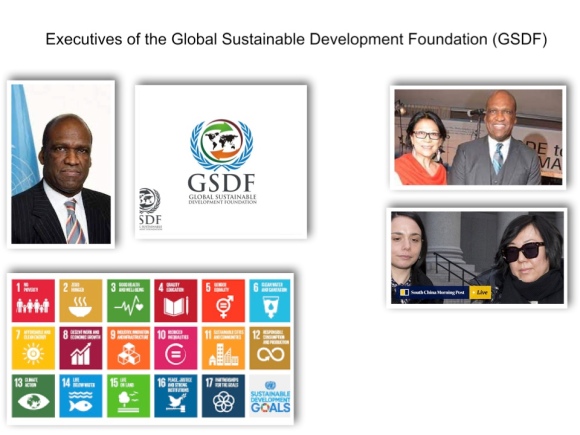
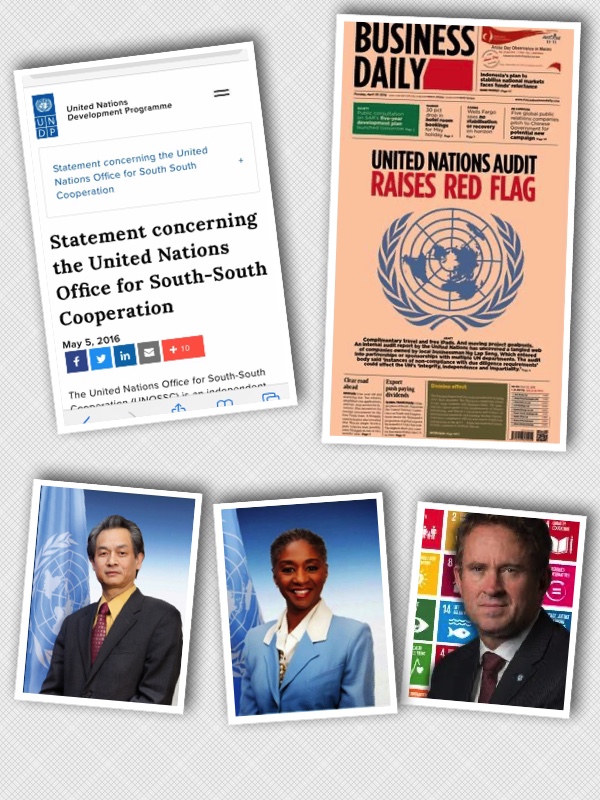
Subsequent Roles
Yiping Zhou: Special Envoy of Director General of the World Women Organization/Chief Advisor of the WWO
Inyang Ebong-Harstrup: Chief of Partnerships, ID 2020
Adam Rogers: Board Member, ConnectAID
US District Judge Vernon Broderick: “there was substantial damage done to the UN itself and the image of the UN”.
Read more from Canada’s CBC News: UN internal audit uncovers lapses tied to bribery scandal | Report highlights the need for greater transparency within the United Nations, officials say
“The United Nations’ internal investigations office has uncovered serious lapses and due-diligence failures in the world body’s interaction with organizations tied to an alleged bribery scheme involving a former UN General Assembly president.
The 21-page confidential report by the UN Office of Internal Oversight Services’ (OIOS), reviewed by Reuters, outlines the results of an audit ordered by Secretary General Ban Ki-moon in response to charges against John Ashe, General Assembly president in 2013-2014, and six other people. …
It noted “important deficiencies” in the way United Nations and its staff interacted with non-governmental organizations (NGOs) and oversees UN employees.
It is the biggest financial corruption crisis to rock the United Nations since the Oil-for-Food scandal hit the world body during the tenure of Ban’s predecessor Kofi Annan.”

Chapter Two: Sustainable Bribery Goals
Chapter Three: Mr Rogers’ ‘Neighborhood’
The Networks
Network 1
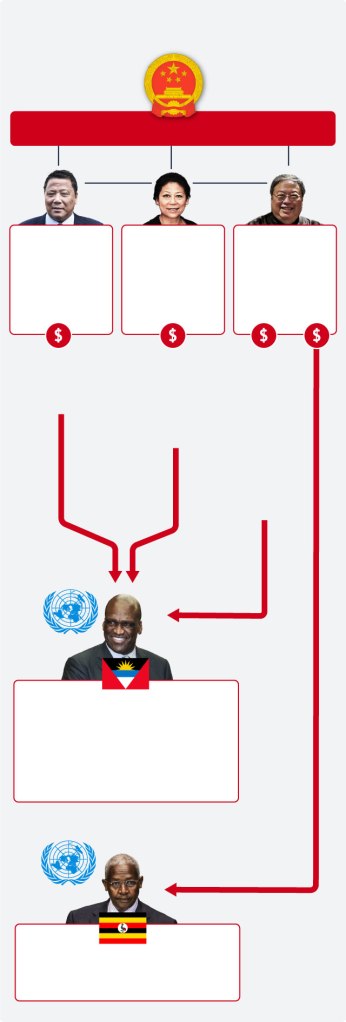
Network 2

Network 3
Network More?




(Sources: Department of Justice, Federal Bureau of Investigation, Supreme Court of the United States)
Chapter Four: I Spy with My Little Eye


Chapter Five: America’s “Bitch” or China’s “Partner”?
Chapter Nine: Pax Chaotica
Pax Chaotica: A Re-evaluation of Post-WWII Economic and Political Order
Chapter Ten: War, Peace & Development
War, Peace And Development | May 2018
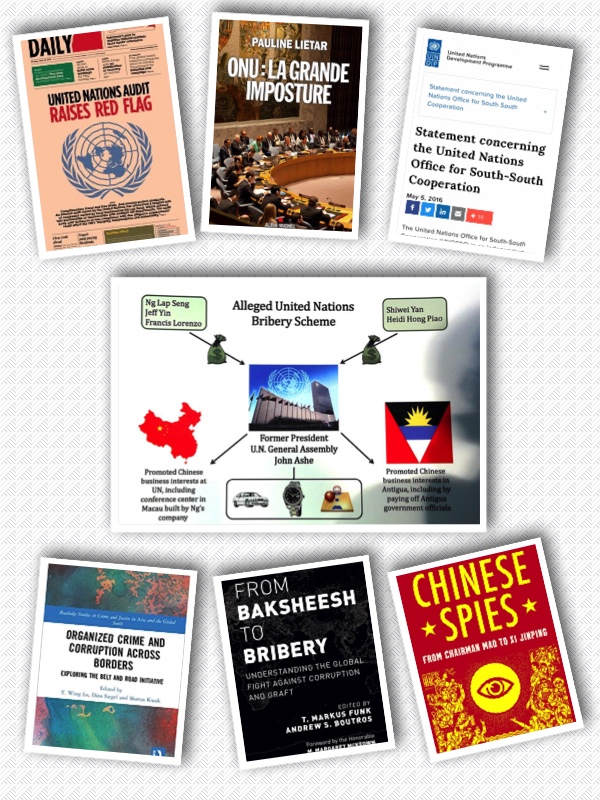

Further Reading
Books
From Baksheesh to Bribery: Understanding the Global Fight Against Corruption and Graft Edited by T. Markus Funk and Andrew S. Boutros, Oxford University Press, 30 May 2019
Blood Brothers: The Criminal Underworld of Asia by B. Lintner, Springer, 2016
“From pirates singing Ricky Martin to mob hits carried out with samurai swords, Bertil Lintner offers a fascinating look at organized crime in the Asia Pacific. Both Western and Asian pundits assert that shady deals are an Asian way of life. Some argue that corruption and illicit business ventures – gambling, prostitution, drug trafficking, gun running, oil smuggling – are entrenched parts of the Asian value system. Yet many Asian leaders maintain that their cities are safer than Sydney, Amsterdam, New York, and Los Angeles. Making use of expertise gained from twenty years of living in Asia, Lintner exposes the role crime plays in the countries of the Far East. In Blood Brothers , he takes you inside the criminal fraternities of Asia, examining these networks and their past histories in order to answer one question: How are civil societies all over the world to be protected from the worst excesses of increasingly globalised mobsters?”
Chinese Spies: From Chairman Mao to Xi Jinping by Roger Faligot, Hurst, 2019
Crime and Development in the Global South by Jarrett Blaustein, Graham Ellison, Nathan Pino, The Palgrave Handbook of Criminology and the Global South, January 2018
Criminology and the UN Sustainable Development Goals: The Need for Support and Critique by Jarrett Blaustein, Nathan W Pino, Kate Fitz-Gibbon, Rob White, The British Journal of Criminology, Volume 58, Issue 4, July 2018
Corruption in the Global Era: Causes, Sources and Forms of Manifestation edited by Lorenzo Pasculli and Nicholas Ryder, Taylor & Francis, 2019
“Corruption is a globalising phenomenon. Not only is it rapidly expanding globally but, more significantly, its causes, its means and forms of perpetration and its effects are more and more rooted in the many developments of globalisation. The Panama Papers, the FIFA scandals and the Petrobras case in Brazil are just a few examples of the rapid and alarming globalisation of corrupt practices in recent years. The lack of empirical evidence on corrupt schemes and a still imperfect dialogue between different disciplinary areas and between academic and practitioners hinder our knowledge of corruption as a global phenomenon and slow down the adoption of appropriate policy responses.”
Historical Dictionary of Chinese Intelligence by I. C. Smith, Nigel West, Rowman & Littlefield Publishers, 5 February 2021
The Long Game: China’s Grand Strategy to Displace American Order by Rush Doshi, Oxford University Press, 08 July 2021
“This introductory chapter summarizes the book’s argument. It explains that U.S.-China competition is over regional and global order, outlines what Chinese-led order might look like, explores why grand strategy matters and how to study it, and discusses competing views of whether China has a grand strategy. It argues that China has sought to displace America from regional and global order through three sequential “strategies of displacement” pursued at the military, political, and economic levels. The first of these strategies sought to blunt American order regionally, the second sought to build Chinese order regionally, and the third — a strategy of expansion — now seeks to do both globally. The introduction explains that shifts in China’s strategy are profoundly shaped by key events that change its perception of American power.“
ONU: la grande imposture by Pauline Liétar, Albin Michel, 4 October 2017
“Au terme d’un long travail d’investigation, la journaliste Pauline Liétar en dévoile les pratiques hallucinantes… et courantes : les soutiens politiques s’achètent, les gaspillages sont légion.”
Organized Crime and Corruption Across Borders: Exploring the Belt and Road Initiative Edited byT. Wing Lo,Dina Siegel, Sharon Kwok, Routledge, 1 April 2021
Chapter: A hard-boiled Belt and Road Backlash to the UN-Bribes-for-OBOR scandals By Daniel Garrett
The Palgrave Handbook of Criminology and the Global South Edited by Kerry Carrington, Máximo Sozzo, Russell Hogg, John Scott, 12 January 2018
“The first comprehensive collection of its kind, this handbook addresses the problem of knowledge production in criminology, redressing the global imbalance with an original focus on the Global South. Issues of vital criminological research and policy significance abound in the Global South, with important implications for South/North relations as well as global security and justice. In a world of high speed communication technologies and fluid national borders, empire building has shifted from colonising territories to colonising knowledge. The authors of this volume question whose voices, experiences, and theories are reflected in the discipline, and argue that diversity of discourse is more important now than ever before. Approaching the subject from a range of historical, theoretical, and social perspectives, this collection promotes the Global South not only as a space for the production of knowledge, but crucially, as a source of innovative research and theory on crime and justice. Wide-ranging in scope and authoritative in theory, this study will appeal to scholars, activists, policy-makers, and students from a wide range of social science disciplines from both the Global North and South, including criminal justice, human rights, and penology.”
Who Blunders and How: The Dumb Side of the Corporate World by Robin Banerjee, Sage Publications, 2019
Wilful Blindness: How a Network of Narcos, Tycoons and CCP Agents Infiltrated the West by Sam Cooper, Optimum Publishing International, May 2021


Corruption in the Global Era: Causes, Sources and Forms of Manifestation edited by Lorenzo Pasculli and Nicholas Ryder, Taylor & Francis, 2019, Who Blunders and How: The Dumb Side of the Corporate World by Robin Banerjee, Sage Publications, 2019,
Wilful Blindness: How a Network of Narcos, Tycoons and CCP Agents Infiltrated the West by Sam Cooper, Optimum Publishing International, May 2021.
Media Reports by Month and Year
The Strange Saga of ‘South-South News’ https://davidsouthconsulting.org/the-strange-saga-of-south-south-news/
In the Headlines
Legal Documents
What is the FCPA? “The Foreign Corrupt Practices Act of 1977, as amended, 15 U.S.C. §§ 78dd-1, et seq. (“FCPA”), was enacted for the purpose of making it unlawful for certain classes of persons and entities to make payments to foreign government officials to assist in obtaining or retaining business. Specifically, the anti-bribery provisions of the FCPA prohibit the willful use of the mails or any means of instrumentality of interstate commerce corruptly in furtherance of any offer, payment, promise to pay, or authorization of the payment of money or anything of value to any person, while knowing that all or a portion of such money or thing of value will be offered, given or promised, directly or indirectly, to a foreign official to influence the foreign official in his or her official capacity, induce the foreign official to do or omit to do an act in violation of his or her lawful duty, or to secure any improper advantage in order to assist in obtaining or retaining business for or with, or directing business to, any person.”
The Docket
“As to §666, the Second Circuit
held that the statutory term “organization” covers not
only private organizations, but also quasi-sovereign
public international bodies like the UN …”

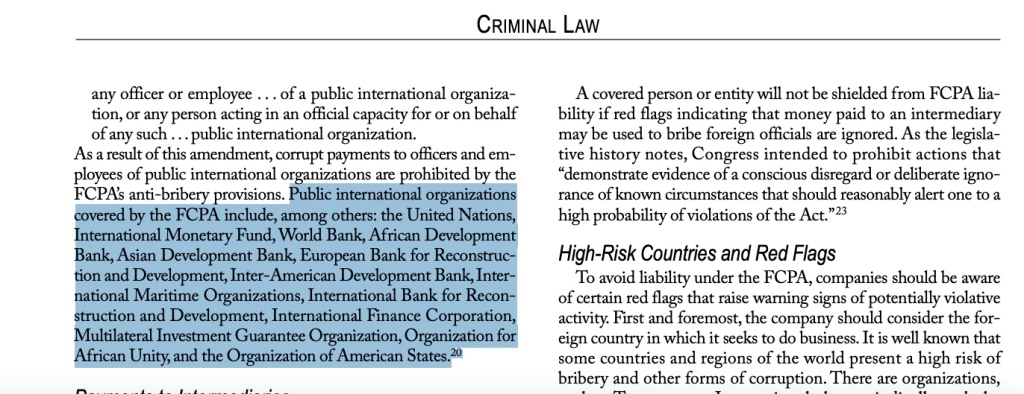
“… corrupt payments to officers and employees of public international organizations are prohibited by the FCPA’s anti-bribery provisions. Public international organizations covered by the FCPA include, among others: the United Nations, International Monetary Fund, World Bank, African Development Bank, Asian Development Bank, European Bank for Reconstruction and Development,Inter-American Development Bank,International Maritime Organizations, International Bank for Reconstruction and Development, International Finance Corporation, Multilateral Investment Guarantee Organization,Organization for African Unity,and the Organization of American States.” (Navigating the Foreign Corrupt Practices Act: The Increasing Cost of Overseas Bribery by Robert C. Blume and J. Taylor McConkie)
FCPA Professor: Bribery Involving The United Nations (December 28, 2017)
“The United Nations has a number of anti-corruption initiatives. For starters, there is the United Nations Convention Against Corruption, it hosts the Conference of the States Parties (COSP) (the main policy-making body of the Convention), and the U.N.’s Global Compact states that “businesses should work against corruption in all its forms, including extortion and bribery.”
Instead of looking outward, perhaps the United Nations should look more inward as several Foreign Corrupt Practices Act enforcement actions … have involved U.N. officials or U.N. programs.”
JDSupra: Court to World: Yes, FCPA Is Still Sweeping
“Compliance officers may have seen news of a recent federal appeals court decision that upheld an expansive view of Foreign Corrupt Practices Act enforcement.
One said the ruling might be “the tip of the iceberg” that heralds more individuals challenging FCPA enforcement.
We rarely get appellate court rulings on the scope of the FCPA, so the case spurred numerous headlines. One said the ruling might be “the tip of the iceberg” that heralds more individuals challenging FCPA enforcement.
For corporate compliance officers running entire programs, however, the case is just more of the same blizzard you’ve been enduring for years – trying to find a steady path forward.
The case itself, U.S. v. Ng Lap Seng, is straightforward. A Chinese national, David Ng, was a wealthy real estate developer in Macau. In the early 2010s he bribed two United Nations officials by giving them sham consulting contracts worth hundreds of thousands of dollars, in exchange for them trying to convince other U.N. officials to declare one of Ng’s convention centers the permanent home for a lucrative annual development conference.
Eventually the scheme unraveled, and in 2017 a jury convicted Ng in federal district court of violating the FCPA.
Ng appealed. He argued that any bribery prosecution must meet the high standards of an “official act” as spelled out in McDonnell v. U.S. — a U.S. Supreme Court ruling from 2016 that addresses cases of domestic bribery of U.S. government officials. Ng wanted that same standard to apply to FCPA cases involving bribery of foreign government officials.
Um, no. The 2nd Circuit Court of Appeals ruled against Ng on Aug. 9, noting that the text of the FCPA defines the quid pro quo of bribery much more expansively than other parts of U.S. law that address domestic bribery. Therefore, the narrow standards of McDonnell don’t apply for FCPA prosecution.”
How to Report Corruption and Bribery at UNDP (United Nations Development Programme)
The Office of Audit and Investigations (OAI) “provides UNDP with effective independent and objective internal oversight that is designed to improve the effectiveness and efficiency of UNDP’s operations in achieving its development goals and objectives through the provision of internal audit and related advisory services, and investigation services.”
They can be directly emailed here: reportmisconduct@undp.org
“UNDP’s ethical culture demands that we all hold each other to the same standards of behavior. We expect that if integrity pervades the organization and those who commit misconduct are called to task, the message will become ingrained. The UN is looked upon as the standard bearer for ethical and humanitarian behavior. Our personnel have an obligation to uphold that legacy because individual actions affect UNDP’s image, credibility and reputation.“


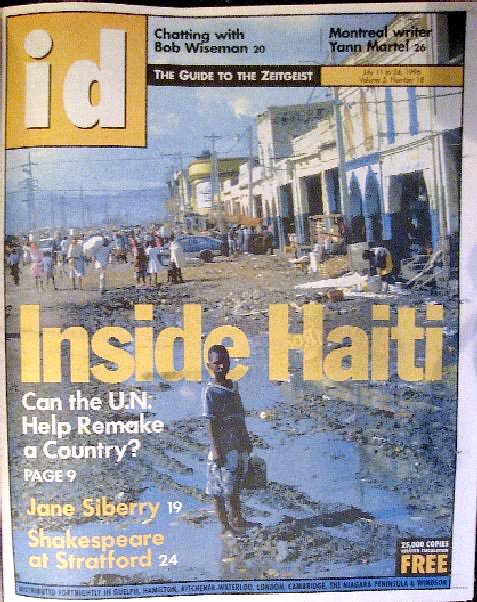









You must be logged in to post a comment.